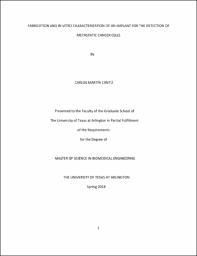
ATTENTION: The works hosted here are being migrated to a new repository that will consolidate resources, improve discoverability, and better show UTA's research impact on the global community. We will update authors as the migration progresses. Please see MavMatrix for more information.
Show simple item record
| dc.contributor.advisor | Tang, Liping | |
| dc.creator | Cantu, Carlos Martin | |
| dc.date.accessioned | 2020-08-04T18:03:14Z | |
| dc.date.available | 2020-08-04T18:03:14Z | |
| dc.date.created | 2018-08 | |
| dc.date.issued | 2018-08-03 | |
| dc.date.submitted | August 2018 | |
| dc.identifier.uri | http://hdl.handle.net/10106/29318 | |
| dc.description.abstract | Greater than 90% of cancer related deaths are due to metastasis (Hayes & Wicha, 2011). Since current conventional techniques detect the disease by the time that it has become systemic, our lab has developed a hydrogel based cancer trap that can attract metastatic cancer cells via cytokine release. However, for continual monitoring and accessibility to the gel, an implant is needed for delivery, retention, and retrieval of the gel. The research undergone in this thesis seeks to develop such a method. Namely, the objective was to develop a polylactide (PLA) based implant that is capable of delivering and retaining a polyethylene glycol based gel, which is filled with cytokines for attracting metastatic cancer cells, in subcutaneous space for continual monitoring of the potential progression of localized cancer cells to a metastatic state. | |
| dc.format.mimetype | application/pdf | |
| dc.language.iso | en_US | |
| dc.subject | Medical devices | |
| dc.subject | Tissue engineering | |
| dc.subject | Implants | |
| dc.subject | Cancer detection | |
| dc.title | Fabrication and In Vitro Characterization of an Implant for the Detection of Metastatic Cancer Cells | |
| dc.type | Thesis | |
| dc.degree.department | Bioengineering | |
| dc.degree.name | Master of Science in Biomedical Engineering | |
| dc.date.updated | 2020-08-04T18:03:14Z | |
| thesis.degree.department | Bioengineering | |
| thesis.degree.grantor | The University of Texas at Arlington | |
| thesis.degree.level | Masters | |
| thesis.degree.name | Master of Science in Biomedical Engineering | |
| dc.type.material | text | |
Files in this item
- Name:
- CANTU-THESIS-2018.pdf
- Size:
- 2.950Mb
- Format:
- PDF
This item appears in the following Collection(s)
Show simple item record


